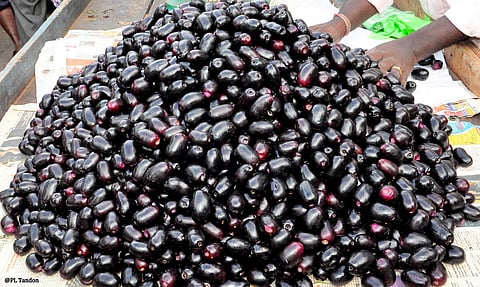

In an age where metabolic disorders such as diabetes, obesity, hypertension, and cardiovascular disease are rapidly on the rise, a traditional fruit known as jamun (Syzygium cumini), navalpazham or black plum, is gaining renewed attention for its potent medicinal and nutritional benefits. Native to the Indian subcontinent and widely cultivated across India, Pakistan, Sri Lanka, and Bangladesh, jamun has long held a special place in traditional medicine systems such as Ayurveda, Unani, and Siddha. Today, its relevance is resurfacing in the context of modern health challenges, particularly those associated with metabolic syndrome.
Metabolic syndrome, often referred to as insulin resistance syndrome, is a cluster of conditions, including high blood pressure, abnormal cholesterol levels, increased blood sugar, and excess abdominal fat, that collectively raise the risk of type 2 diabetes and cardiovascular disease. The World Health Organization estimates that over a billion people worldwide are affected by metabolic syndrome, a number expected to climb due to sedentary lifestyles, poor dietary habits, and increasing urbanisation.
In this context, the value of functional foods, those offering health benefits beyond basic nutrition, is more critical than ever. Jamun stands out as a potent example. The deep purple fruit, along with various parts of its tree, is rich in bioactive compounds such as flavonoids, polyphenols, anthocyanins, alkaloids, tannins, and essential vitamins like vitamin C and iron. These compounds have been shown to exert a wide range of pharmacological actions that support metabolic health and general well-being.
For individuals battling diabetes, jamun offers particular promise. Its low glycemic index means that it doesn’t cause sharp spikes in blood sugar levels. Both the pulp and the seed of the fruit play a role in regulating blood glucose. In traditional practices, powdered jamun seeds have been used for centuries to help control blood sugar levels and to manage symptoms such as frequent urination, thirst, and fatigue.
Beyond diabetes, jamun also shows therapeutic potential for a host of other health concerns. It exhibits antioxidant, anti-inflammatory, hypolipidemic (cholesterol-lowering), gastroprotective, antibacterial, and even anticancer properties. In Unani medicine, it is traditionally prescribed as an astringent, a hemostatic agent to stop bleeding, a sexual tonic, and a remedy for urinary incontinence. Ayurvedic texts also note its usefulness in treating common ailments such as cough, colds, allergic asthma, indigestion, and piles.
Modern studies attribute these health benefits to a rich composition of phytochemicals, including ellagic acid, isoquercetin, myricetin, and kaempferol, powerful antioxidants that help scavenge harmful free radicals, reduce inflammation, and support detoxification processes. The fruit, bark, leaves, seeds, and even the trunk of the jamun tree are utilised for various medicinal preparations, highlighting its versatility.
Health practitioners and nutritionists now advocate for integrating traditional foods into contemporary diets to manage and prevent chronic illnesses more naturally and cost-effectively. As research into jamun’s pharmacological actions continues to grow, it may pave the way for developing plant-based therapeutic agents that offer holistic solutions for lifestyle-related diseases.
As the nutrition and wellness industry increasingly embraces time-tested remedies, jamun serves as a reminder that the key to combating modern metabolic disorders may lie in the fruits of ancient traditions. With its proven benefits and broad therapeutic potential, jamun isn’t just a seasonal delicacy; it’s a promising ally in the fight against one of the 21st century’s most pressing health challenges. Incorporating jamun into daily diets or therapeutic practices can serve as a natural and accessible approach to managing lifestyle diseases. Its powerful blend of nutrients and medicinal compounds makes it more than just a traditional fruit; it’s a valuable, evidence-backed solution for promoting long-term metabolic health and improving quality of life.